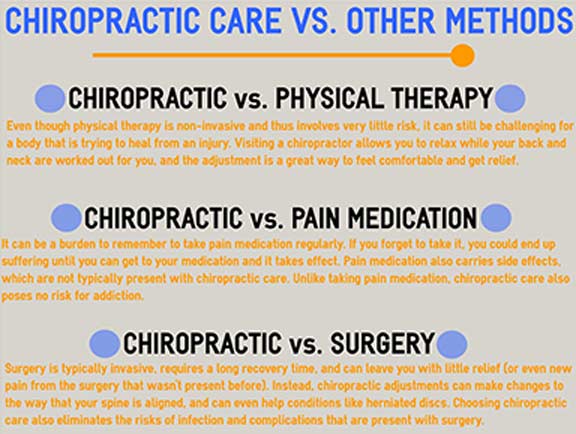The Impact Of Diet On Back Pain Monitoring: Foods To Incorporate And Foods To Exclude
The Impact Of Diet On Back Pain Monitoring: Foods To Incorporate And Foods To Exclude
Blog Article
Published By-Russo Guldborg
When it comes to handling your back pain, the food options you make can dramatically affect how you feel daily. Think of having the ability to ease your discomfort just by adjusting what you eat. By recognizing the function of nutrition in neck and back pain monitoring and knowing which foods to integrate or steer clear of, you can take proactive actions in the direction of a healthier and much more comfy way of living. The connection in between nutrition and back health is extra profound than you may recognize-- let's explore how specific foods can either calm or worsen your neck and back pain.
Value of Nourishment in Pain In The Back
Nutrition plays a crucial duty in managing neck and back pain. Your diet can significantly impact inflammation degrees and general pain degrees in your back. Eating a balanced diet rich in nutrients like vitamins D and K, calcium, magnesium, and omega-3 fats can help in reducing inflammation and enhance bones, which are vital for back health and wellness.
Additionally, keeping a healthy weight with correct nourishment can ease stress on your back, decreasing the threat of neck and back pain.
In addition, specific nutrients like anti-oxidants located in fruits and vegetables can help battle oxidative tension and promote recovery in the body, consisting of the back muscles and back.
On the other hand, taking in excessive amounts of refined foods, sugary drinks, and harmful fats can contribute to inflammation and weight gain, exacerbating back pain.
Foods to Eat for Back Health
To support a healthy back, incorporating nutrient-rich foods right into your everyday dishes is crucial. Consisting of foods high in antioxidants like berries, spinach, and kale can help in reducing swelling in your back, easing discomfort and pain. Omega-3 fatty acids found in fatty fish such as salmon and mackerel have anti-inflammatory residential or commercial properties that can profit your back wellness.
Additionally, eating visit link and seeds like almonds, walnuts, and chia seeds provides important nutrients like magnesium and vitamin E, which sustain muscle feature and reduce oxidative tension. Including lean proteins such as chicken, turkey, and tofu can help in muscle mass fixing and upkeep, advertising a solid back.
Do not neglect to include milk or fortified plant-based choices for calcium to support bone health and wellness. Lastly, hydrate with plenty of water to maintain your back discs moisturized and operating ideally. By including these nutrient-dense foods in your diet, you can nurture your back and support overall back health and wellness.
Foods to Prevent for Pain In The Back
Opt for preventing refined foods high in sugarcoated and trans fats when seeking relief from neck and back pain. These sorts of foods can contribute to swelling in the body, which might exacerbate pain in the back. Say no to holistic medicine austin treats sweet, pastries, and sweet beverages, as well as fast food products like hamburgers, french fries, and fried hen that are frequently packed with trans fats.
Additionally, stay away from foods including high degrees of polished carbs, such as white bread, pasta, and pastries, as they can spike blood sugar level degrees and possibly get worse inflammation in the body.
It's likewise smart to restrict your consumption of foods high in hydrogenated fats, like red meat and full-fat milk products, as they can add to inflammation. Refined foods like delicatessens meats, chips, and packaged treats are typically high in hydrogenated fats and need to be eaten in small amounts.
Conclusion
To conclude, taking notice of your diet regimen and making smart food selections can have a significant effect on handling back pain. By integrating nutrient-rich foods like berries, fatty fish, nuts, and lean proteins, and staying clear of refined and sweet items, you can help in reducing inflammation and support overall back health. Keep in mind, what you eat plays an essential function in just how you feel, so ensure to prioritize your nourishment for a healthier back.
